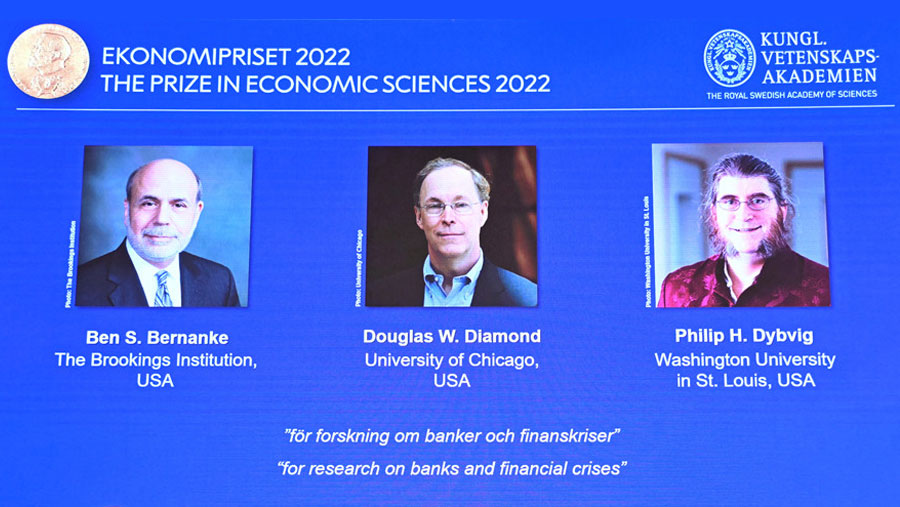


The Royal Swedish Academy of Sciences has decided to award the 2022 Sveriges Riksbank Prize in Economic Sciences in Memory of Alfred Nobel to Ben S. Bernanke, Douglas W. Diamond and Philip H. Dybvig “for research on banks and financial crises.”
The work for which Ben Bernanke, Douglas Diamond and Philip Dybvig are being recognised has been crucial to subsequent research that has enhanced our understanding of banks, bank regulation, banking crises and how financial crises should be managed, the academy said in its announcement.
Ben Bernanke analysed the Great Depression of the 1930s, the worst economic crisis in modern history. Among other things, he showed how bank runs were a decisive factor in the crisis becoming so deep and prolonged. Using historical sources and statistical methods, Bernanke’s analysis showed which factors were important in the drop in gross domestic product. He found factors that were directly linked to failing banks accounted for the lion’s share of the downturn.
The 2022 economic sciences laureates Douglas Diamond and Philip Dybvig developed theoretical models that explain why banks exist, how their role in society makes them vulnerable to rumours about their impending collapse and how society can lessen this vulnerability.
Diamond and Dybvig presented a solution to bank vulnerability, in the form of deposit insurance from the government. When depositors know that the state has guaranteed their money, they no longer need to rush to the bank as soon as rumours start about a bank run.
Diamond also showed how banks perform a societally important function. As intermediaries between savers and borrowers, banks are better suited to assessing borrowers’ creditworthiness and ensuring that loans are used for good investments.
Unlike the other prizes, the economics award wasn't established in Alfred Nobel's will of 1895 but by the Swedish central bank in his memory. The first winner was selected in 1969.
Last year, half of the award went to David Card for his research on how the minimum wage, immigration and education affect the labor market. The other half was shared by Joshua Angrist and Guido Imbens for proposing how to study issues that don't easily fit traditional scientific methods.
The Nobel Prize announcements kicked off Oct 3 with Swedish scientist Svante Paabo receiving the award in medicine for unlocking secrets of Neanderthal DNA that provided key insights into our immune system.
Three scientists – Frenchman Alain Aspect, American John F. Clauser and Austrian Anton Zeilinger – jointly won the prize in physics on Tuesday for their works on quantum entanglement, that can be used for specialized computing and to encrypt information.
The Nobel Prize in chemistry was awarded on Wednesday to Americans Carolyn R. Bertozzi and K. Barry Sharpless, and Danish scientist Morten Meldal for developing a way of “snapping molecules together” that can be used to explore cells, map DNA and design drugs that can target diseases such as cancer more precisely.
French author Annie Ernaux won this year's Nobel Prize in literature on Thursday. The panel commended her for blending fiction and autobiography in books that fearlessly mine her experiences as a working-class woman to explore life in France since the 1940s.
The Nobel Peace Prize went to jailed Belarus human rights activist Ales Bialiatski, the Russian human rights organisation Memorial and the Ukrainian organisation Center for Civil Liberties on Friday.
The prizes carry a cash award of 10 million Swedish kronor (nearly $900,000) and will be handed out on Dec 10.